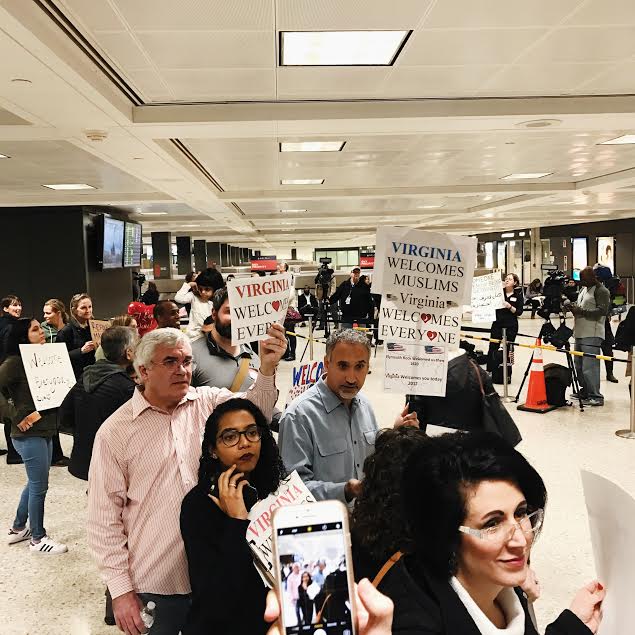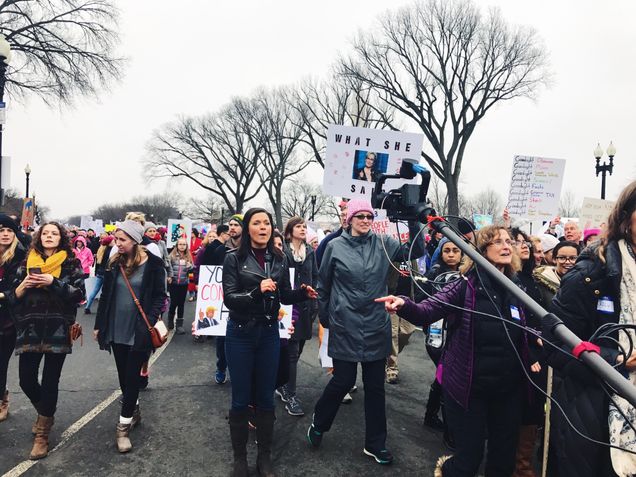Protesting in the Age of Trump
by Sekar Krisnauli (Spring 2017)
President Donald Trump’s policies is turning out to be one of the most potent calls for Washington activism that reaches out to people all across the nation. Trump’s call to defund Planned Parenthood, his proposing the “Muslim ban” twice, his disregard towards a common shared of facts and science and his unwillingness to release his tax returns have attracted over a million people to march the streets of Washington, D.C.
I expected a rich climate for political activism and grassroots organizing before arriving in D.C. January 9. However, the magnitude of the demonstrations I have seen over the past few months surprise me. The crowd and demographic these protests have attracted in Washington is unprecedented despite the existence of “sister marches” in different cities around the country and the world.

People gathered at the Dulles International Airport to welcome and greet those who just landed from international flights in Washington, D.C. following President Donald Trump’s first “Muslim ban.” / PHOTO TAKEN BY SEKAR KRISNAULI
Politics and activism have always been a dominant part of the D.C. culture. I would argue that a good portion of people living in D.C. continuously look to impact issues they are passionate of and communities they care about on the national stage. I’ve met many people who regularly attend and organize town-hall meetings; I often find small groups of activists on the street handing flyers; I’ve even overheard drunken conversations about the kinds of activism these drunken people do during the day.
Politics and activism have come across to be one of the more formidable parts of individual Washingtonians, and though it seems to be the main force that keeps this city rolling, there is more to the city that goes beyond politics.
In the Trump presidency however, activism seems to have reached the non-politico Washingtonians, is becoming more ingrained in daily life and has turned into creative yet individually risky movements: a wide range of people were strongly against Trump’s immigration policy that people on social media created the nationwide “Day Without Immigrants” which lead to the closing of numerous restaurant chains in D.C.; women again rallied against the Trump administration by opting out of work, wearing red and refusing to spend money in the “A Day Without a Woman” protest.
Those two “days” showed me that taking part in political activism is turning into such a meaningful part of one’s life that some risk their jobs to stand up for what they believe in.
It further seems as if being in Washington for these large protests is momentous. When I covered the Women’s March as part of my internship, I couldn’t even count with my hands the people who told me they drove long hours and even fly to be in Washington for it. The Environmental Student Organization at Boston University even rented a bus for any interested party to attend the Climate March in Washington.

ABC News’ digital reporter conducted a live stream of the Women’s March in the middle of the ongoing march / PHOTO TAKEN BY SEKAR KRISNAULI
The fact that people would go out of their ways to be part of the movement in Washington elevates the role politics, activism and grassroots organizing play in the life of Washingtonians and to the city’s heartbeat. Maybe non-Washingtonian marchers really do want to “knock on the door of the Trump White House” or maybe being in Washington for political activism is an experience in itself. I guess I will find out once I leave Washington for Boston, and maybe it will be true for me too.
Sekar is a junior studying journalism with a minor in Muslim societies and interning at ABC News’ Global Affairs and Pennsylvania Avenue units.

